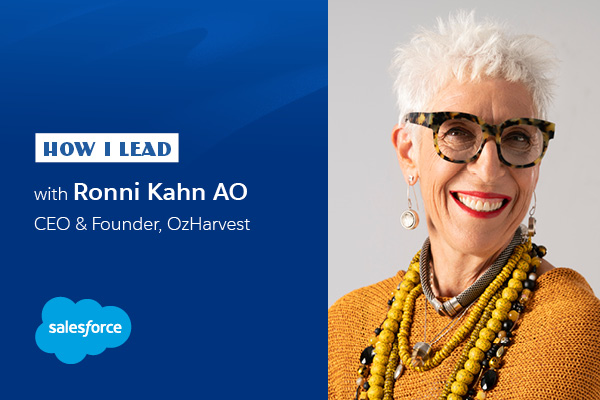Ronni Kahn AO founded food rescue charity OzHarvest in 2004 after realising how much food was going to waste in restaurants, shopping centres, conference rooms, airports, cafes and catering companies across the country.
When liability laws threatened to derail her efforts, she changed the law. Today she is a hero to many and OzHarvest’s distinctive yellow vans are beacons of welcome and hope across Australia, having rescued food for some 117 million meals.
Lessons from the dinner table
“Finish what’s on your plate — there are people starving in China/Africa/Asia!” It’s the well-worn refrain of our childhood dinners. We have all grown up with the message that wasting food is bad, and that is a good start, but it’s always been ‘elsewhere’ in a far-flung and hard to imagine place.
We are less likely to have understood that people need food right here in our own country. Food security isn’t just an issue in far away places. It’s an issue for 5 million Australians.
Given that a third of all food goes to waste, it’s hard to comprehend so many people could still be in such desperate need. But that is the reality of food waste and hunger, and the challenge OzHarvest tackles by rescuing food and distributing it to charities that can best reach people in need.
It would be easy to be discouraged by the figures around food wastage and food security. And it can be very hard for people to imagine they can make any kind of difference as an individual. But we all have power as individuals — we just need to own it and put it to use, whether by taking action in our own households, schools and communities; writing letters to our representatives; or holding supermarkets to account.
The younger generations are so connected to action — I find that really exciting and encouraging. There is a palpable sense of purpose and momentum. Just look at Greta Thunberg and the climate strikers. They really understand the impact they can have. They don’t just listen to our instructions across the dinner table — they really do something about it!
The power of an ordinary person
People often think that when I was younger I must have had a drive to cause change — that I must always have been a bit of an activist, a Greta Thunberg as a teenager. But the truth is, I didn’t. I had no aspiration to be an activist, start a charity, or be a leader. Indeed, being an activist in South Africa where I grew up could be dangerous. I was very ordinary. I still am very ordinary and I’m proud to be! After all, ordinary people can accomplish extraordinary things.
It has really been over the past 20 years that my drive to address food waste developed. I had a strong need to understand why I’d been put on this earth and felt there must be more I could do than just look after me and my immediate family.
Working in events, I saw food waste on a massive scale and was appalled by it. I had started taking action on a small scale — dropping off leftover food at a shelter in Sydney — but felt on the cusp of something more substantial. I had lived in Australia for more than 20 years and returned to South Africa for a visit that spurred me into action.
I accompanied a friend who’d started a social enterprise on a trip, and she showed me what she’d built and the impact it had.
I was ready — that was just the push I needed to launch OzHarvest.
Even then, I still didn’t fully comprehend the scale of the problem of hunger. But perhaps that naivete worked to my advantage — it just didn’t occur to me that I couldn’t solve it so I didn’t feel too daunted to act. My philosophy was that feeding 100 people meant that was 100 people fed who previously weren’t. Not doing something because a problem is too big just wasn’t an answer I was prepared to accept.
Becoming a disruptor
My goal in the beginning was to rescue food and feed people. I discovered that the social impact could be matched by the environmental impact by reducing landfill, so that became part of the OzHarvest mission too.
But to realise those social and environmental benefits, laws had to change. People were worried about issues of liability if their business handed over leftover food to us, and government legislation was standing in the way of our work. And so we challenged and changed legislation. Fearlessness is part of the DNA of OzHarvest. Today I think that’s called disruption — which makes me a disruptor! But again, it didn’t occur to me that I might not be able to get that law changed.
There is still so much work to be done. Yes, Australia has committed to halving food waste by 2030, and at OzHarvest we rescue more than 180 tonnes of food each week from more than 3,500 food donors including supermarkets, hotels, airports and catering companies. But the government shirks its responsibilities and so I won’t stop agitating for change until those responsibilities are met. I’ll do my damndest and they know it!
Leading with intuition
I don’t get any of this done on my own. I surround myself with incredibly smart and skillful people, and they make me look amazing!
The most important thing for me is to hire the right people, not necessarily the right skills. You can learn skills. But you can’t learn how to be the right person for the culture. I use my intuition when I’m hiring people because for me, that cultural fit, that mindset is so important. The rest we can help them learn. Maintaining that culture is an important part of my role as leader.
I always look for resilience and resourcefulness. I don’t ask people in an interview if they are resilient — who’s going to say no? But I’m good at digging deeper and finding out if it’s there and what it means to them. And being resourceful is so important because resilience takes a lot of energy and you have to be able to look after yourself while you’re not giving up.
I also accept that leading by example means trusting my team to be as bold as I am in pursuing our mission to help people, empowering them and trusting their ability to make the right decisions at the right time.
Technically, we are licensed to collect food and deliver it to charities and organisations that distribute it according to need. And those charities do know best — food is an important part of their work on a range of fronts, attracting people to their services for medical, housing and other support.
If one of my drivers saw someone in need outside of their scheduled charity drop-offs, and they have the ability to feed them I would wholly support and encourage that. Yes, we have a framework in place, but sometimes empathy trumps that!
After all, when you are a ‘disruptor’, you have to be prepared to deal with a little disruption yourself! I accept that my people are sometimes going to make decisions that might stretch the parameters of our mission, but I trust them. And they trust me.
Small and Medium Business Trends report
Keen to become a disruptor and start something? Check out our recent Small and Medium Business Trends report.
















